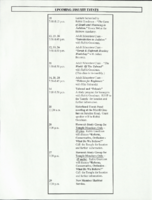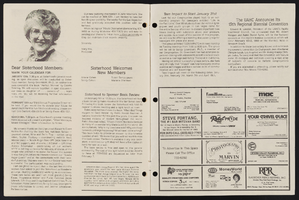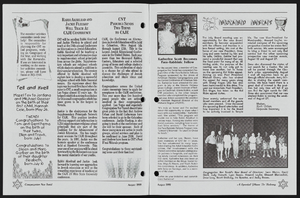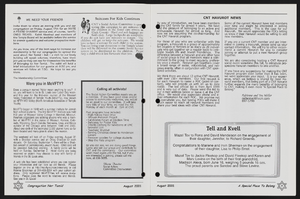Search the Special Collections and Archives Portal
Search Results

Minutes from Temple Beth Sholom Board of Directors meetings, 1998
Date
Archival Collection
Description
Meeting minutes include reports from committees of the board, correspondence, and balance sheets.
Text

Lily Teo oral history interview: transcript
Date
Archival Collection
Description
Oral history interview with Lily Teo conducted by Stefani Evans on February 7, 2022 for Reflections: The Las Vegas Asian American and Pacific Islander Oral History Project. Lily Teo discusses her upbringing in Singapore, her education, her religious beliefs, and converting from Buddhism to Catholicism. She talks about her husband, her early married years, and what life was like as a young mother of three children. Teo shares how she started a catering business to feed construction workers and was responsible for shopping for ingredients, preparing all meals and tea, and cooking the food on site in her temporary kitchen. She talks about her children, the faiths they practice and languages they speak including English, Malay, and Mandarin, and the customs and traditions they practice, such as celebrating Lunar New Year and other holidays. Lily's daughter, Stella, sits in on the interview and expands on her mother's recollections.
Text

June Monroe and Kazuko Atomura oral history interview: transcripts
Date
Archival Collection
Description
Oral history interviews with June Monroe and Kazuko Atomura conducted by Cecilia Winchell and Stefani Evans on July 14 and July 19, 2022 for Reflections: the Las Vegas Asian American and Pacific Islander Oral History Project. In the first interview, Kazuko Atomura describes her childhood in Taiwan and Tokyo, Japan, and shares both happy and difficult mememories of that time. Atomura eventually moved to Los Angeles, California, where she reconnected with a man she previously met in Japan. She married him and together had their daughter, June Monroe, and another son while living in Corpus Christi, Texas. After difficult medical procedures involving Atomura's husband and Monroe's younger brother, Brian, the family relocated to Las Vegas, Nevada. Monroe recalls attending Las Vegas High School and Bonanza High School, and the struggle of making new friends as a young person. In the second interview, the mother and daughter discuss racism, discrimination, and identity. Kazuko Atomura recalls her many experiences with discrimination as a result of both her appearance and language barriers. June Monroe discusses how she came to be proud of her Japanese heritage, while Atomura discusses some of the community activities she has been involved in since living in Las Vegas including the Japanese Culture Club and odori dancing. Then, both Atomura and Monroe discuss Monroe's brother, Brian, who received two kidney transplants; one from Monroe's father and one from Monroe herself. Atomura talks about the shrines she has built for Brian, the experience of him being on dialysis, care taking, and his final days. Monroe shares about her activism with organ donation, being regularly involved with the Nevada Donor Network and helping to pass significant pieces of legislation within the area of organ donation.
Text

Cynthia Mun oral history interview: transcript
Date
Archival Collection
Description
Oral history interview with Cynthia Mun conducted by Vanessa Concepcion and Stefani Evans on March 31, 2021 for Reflections: The Las Vegas Asian American and Pacific Islander Oral History Project. Cynthia Mun discusses her upbringing near Seoul, South Korea and her family's immigration to Los Angeles in 1974. She talks about her parents' employment as a seamstress and a janitor, as well as the educational mentors she encountered who helped her to succeed at Westridge School for Girls in Pasadena and later at Yale University. Mun shares her corporate employment history, including helping to launch the Pandora streaming service and creating an accessible platform for E-book use before the creation of Amazon Kindle. Mun talks about her career working at MGM International and how this opened the door for her mother to become an MGM employee and access better working conditions with union employment.
Text

Transcript of interview with Helen Naugle by Irene Rostine, October 31, 1996
Date
Archival Collection
Description
Prior to 1962, Helen Naugle had only visited Las Vegas once in her life while traveling from Idaho to California for a vacation with her husband and her boss. The group made a quick stop so her boss could interview for a position with EG&G and, as fate would have it, EG&G did not hire Helen’s boss. However, they did extend a job offer to Helen’s husband. A month later, Helen, her two daughters, and her husband became residents of Las Vegas, Nevada. Before moving to Nevada, Helen enjoyed singing in super clubs and performing on her radio show, “Melodies from Meadowland” and working for American Machine and Foundry. Upon her arrival in Las Vegas, Helen went to work for Bonanza Airlines before attending real estate school. In 1963, Helen opened her first office, Bruce Realty, and in 1965, she obtained her Broker’s license. She spent the next ten years selling general real estate. During this period, Helen was an active member of the Board of Realtors, as well as an early participant in the Board’s newly formed Women’s Council. Fate would strike again in Helen’s life while she was visiting her daughter at college in Arizona where she read an article in the Phoenix newspaper about a group of brokers who had formed a networking association to sell hotels and motels across the country. As a result of her initial contact with this association, Helen spent the next four decades selling hotels and motels throughout the State of Nevada, including Las Vegas, Elko, Tonopah, and Wells. She eventually became the first woman President of the American National Hotel-Motel Association. The cultural diversity of hotel and motel buyers would provide Helen with opportunities to travel the world and work with buyers from many different countries and cultural backgrounds. It also led to Helen’s membership in the FIABCI (International Real Estate Federation) and her Certified International Property Specialist and Federation of International Property Consultants certifications. Helen was also selected by the Association to represent the Air Force as “Innkeeper Evaluator” for one year. This honor took her to five Air Force bases in the United States and to Clark Air Force Base in the Philippines. During Helen’s career in hotel and motel real estate sales, she witnessed the transition from “mom-and-pop” American buyers to the influx of international buyers predominately from East India and Asia. The opportunities for helping repeat buyers and sellers gradually went away, as foreign buyers entered the market and tended to resell their properties to friends and family members from their own countries. During the latter part of her career, Helen found time to give back to the Las Vegas community through her volunteer work helping to establish the Scleroderma Foundation of Nevada. She also served on the Board of Directors of the Downtown Las Vegas Partnership where she focused on public safety in the area encompassing the Fremont Street Experience. Her work with both of these organizations allowed her to draw on her career experience for the benefit of others. Whether it was fate, or as Helen put it, she “just lucked into a lot of things,” one thing is certain - Helen Naugle was certainly a trail blazer for women in the hotel-motel niche of the real estate business, not only in Nevada, but across the nation.
Text





